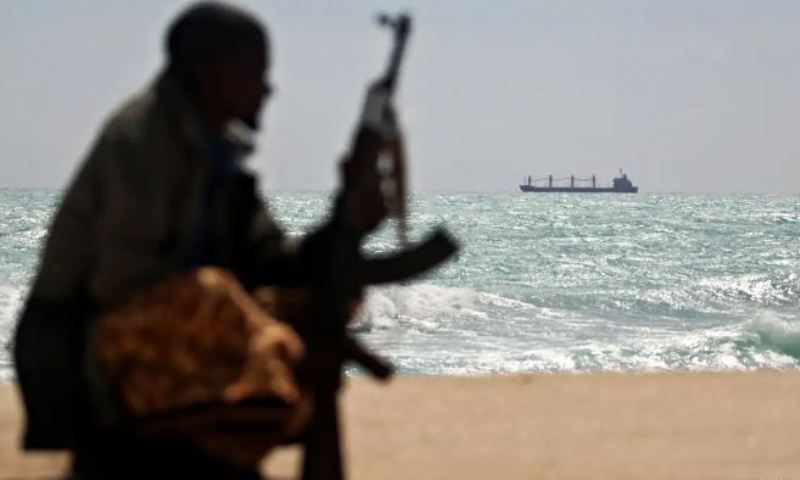The Indian Navy and European Union naval forces have launched an intensive maritime surveillance operation to track a Somali pirate action group responsible for a series of attacks in the Indian Ocean, including last week’s dramatic hijacking of the tanker HELLAS APHRODITE.
According to EUNAVFOR’s Maritime Security Centre Indian Ocean, “The Pirate Action Group (PAG) linked to recent incidents is being monitored closely by the Indian Navy and EUNAVFOR Operation ATALANTA,” with authorities maintaining that “there is currently no threat from this group to merchant vessels.”
European naval forces successfully liberated the Maltese-flagged tanker HELLAS APHRODITE Friday afternoon following a 30-hour ordeal approximately 700 nautical miles off Mogadishu. All 24 crew members emerged unharmed after taking refuge in the vessel’s citadel during the November 6 attack by pirates armed with small arms and rocket-propelled grenades.
The rescue showcased international coordination, with the Spanish flagship ESPS VICTORIA deploying helicopters, unmanned aerial vehicles, maritime patrol aircraft, and a Special Operations Team. Support came from Puntland authorities, Combined Maritime Forces Japanese P3C aircraft, Seychelles Maritime Reconnaissance Patrol Aircraft, and Spanish Joint Operations Command.
“After an early show of force of the Pirate Action Group abandoned the Merchant Tanker,” EUNAVFOR stated in its official release.
Pirates Remain at Large
Despite the successful rescue, significant concerns persist. “The mother ship and the pirates remain in the area,” EUNAVFOR warned, noting that “a coordinated joint operation is ongoing to intercept the dhow used in this attack.”
Maritime authorities maintain that “the threat assessment in the area surrounding the incident remains critical,” urging vessels to exercise extreme caution when transiting the region.
Evidence is being gathered to support potential legal prosecution of the alleged pirates, with ATALANTA and its maritime security partners continuing an intensive search for the Pirate Action Group.
The HELLAS APHRODITE hijacking represents the culmination of an eight-day campaign by the same pirate group, which previously targeted the Stolt Aphrodite on November 3 and the fishing vessel Intertuna Tres on November 2, according to Martin Kelly, Head of Advisory at EOS Risk Group.
On November 3, the chemical tanker MV Stolt Sagaland successfully repelled an attack approximately 330 nautical miles east of Mogadishu when armed security personnel fired warning shots at four unauthorized persons attempting to board.
On Friday, the Marshall Islands-flagged LNG carrier Al Thumama reported an approach by a small craft with three people aboard near where the Hellas Aphrodite was targeted. The tanker, traveling from Qatar to Poland via the Cape of Good Hope, successfully outran the speedboat.
Resurgence of Maritime Piracy
These incidents reflect a troubling pattern that began in November 2023 with a series of dhow hijackings, coinciding with Houthi attacks in the Red Sea region. Pirates typically use hijacked dhows as “mother ships” to launch attacks hundreds of miles offshore in the Indian Ocean.
Operation ATALANTA documented dozens of incidents in the Somali Basin and Gulf of Aden in 2024, including four merchant vessel boardings and two notable hijackings: the MV Ruen, held for three months before being rescued by the Indian Navy, and the MV Abdullah , released after a month reportedly following a large ransom payment. January 2025 saw the hijacking of a Chinese fishing vessel off Somalia’s northeastern Puntland coast.
Operation ATALANTA strongly recommends that merchant and other vulnerable vessels register in the Maritime Security Centre Indian Ocean’s Voluntary Registration Scheme to enable the most effective monitoring and response by ATALANTA forces and their partners in countering maritime security threats.
Maritime authorities had previously advised vessels to avoid a 100-nautical-mile radius from attack locations where pirate action groups are considered active, stressing that “the timely and comprehensive reporting of incidents and suspicious activity remains crucial to allow for a rapid incident response.”
All assessments and recommendations are shared through appropriate channels with shipping operators and updated on the Maritime Security Centre Indian Ocean website.

